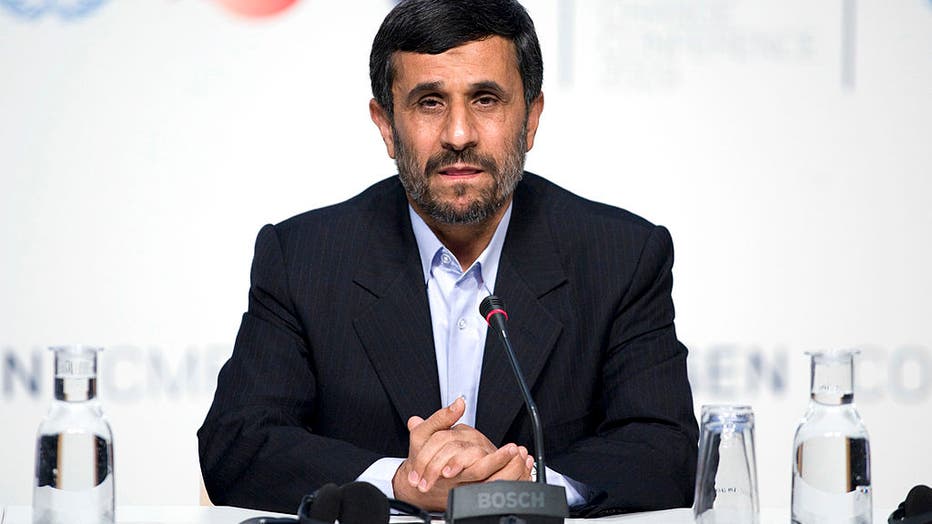Why Iran wants to attack Israel: The history of the conflict explained

RPT: Iran to strike Israel in 24-48 hours
Iran is expected to conduct a strike on Israel within 24 to 48 hours, according to a report from the Wall Street Journal citing U.S. officials. Professor Jonathan Rynhold at Bar-Ilan University joined LiveNOW from FOX's Josh Breslow to discuss the report.
Israel remains on high alert following reports of the U.S. monitoring "credible" threats of an Iranian attack in response to a strike on Iran’s Damascus consulate, despite indications that Iran is considering a non-escalatory approach.
Amid escalating tensions and growing apprehensions of a looming Iranian attack and the potential spread of the Gaza conflict, multiple nations have taken proactive measures, issuing warnings to their citizens against traveling to the region. These advisories underscore the heightened sense of caution pervading international concerns, reflecting the seriousness of the situation and the imperative to prioritize safety amidst uncertain geopolitical developments.
The recent uptick in tensions between Iran and Israel is merely the latest chapter in a longstanding history of conflict between the two nations, exemplified by Israel's recent strike on Iran's consulate in Syria. This latest incident underscores the enduring pattern of violence and hostility that has characterized their relationship over time.
Understanding the origins of the conflict
The conflict between Iran and Israel is a long-standing geopolitical struggle that has persisted for decades.
The origins of this conflict can be traced back to the establishment of the State of Israel in 1948 and the ensuing Arab-Israeli wars.
Initially, Iran, predominantly Shiite Muslim, had amicable relations with Israel.
However, following the Iranian Revolution in 1979, which brought about the Islamic Republic under Ayatollah Khomeini, Iran cut diplomatic ties with Israel. The new Iranian leadership, fueled by anti-Israel sentiments and backing for Palestinian liberation movements, emerged as a staunch adversary of the Israeli state.
Israel-Iran proxy conflicts
Iran's support for militant groups like Hezbollah in Lebanon and Hamas in Gaza, which have engaged in armed conflict with Israel, has exacerbated tensions between the two nations.
Israel, in turn, has conducted military strikes against Iranian targets in Syria, viewing Iran's presence there as a threat to its security.
The backing of proxy militant groups by Iran is rooted in a conflict driven by wider regional power struggles as both nations seek to assert influence in the Middle East.
Nuclear ambitions and international concerns
Iran's pursuit of nuclear technology has been a major source of concern for Israel and the international community.
Israel views Iran's nuclear program as a potential existential threat and has repeatedly called for measures to prevent Iran from acquiring nuclear weapons capabilities. Tensions have escalated over Iran's defiance of international sanctions and its continued enrichment of uranium.
Israel's fear of Iran's nuclear program stems from past instances of Iranian leaders openly advocating for Israel's destruction. For example, in October 2005, Iran's President Mahmoud Ahmadinejad notoriously declared that Israel must be "wiped off the map."

Mahmoud Ahmadinejad, Iran's president, speaks at a press conference on the final day of the COP15 United Nations Climate Change Conference at the Bella Centre in Copenhagen, Denmark, on Friday, Dec.18, 2009.
This provocative rhetoric has intensified Israeli concerns and underscored the perceived danger posed by Iran's nuclear ambitions.
Israel's small size and vulnerability to conventional and unconventional threats mean that even a limited nuclear arsenal in the hands of Iran could undermine Israel's deterrence capabilities and increase the risk of conflict escalation.
Ongoing challenges and prospects for peace
Despite occasional diplomatic efforts to ease tensions, the Iran-Israel conflict remains deeply entrenched. Historical grievances, ideological differences, and geopolitical rivalries continue to fuel distrust and hostility between the two nations. As both Iran and Israel assert their interests in the region, the prospect of a lasting peace remains elusive.
Understanding the ripple effects on American interests
A potential war between Israel and Iran holds significant implications for the United States, impacting various strategic interests in the region and beyond.
On Friday, Biden was asked how imminent a potential attack on Israel is, to which he responded: "I don't want to get into secure information, but my expectation [is] sooner than later."
"We are devoted to the defense of Israel," he added. "We will support Israel. We will defend, help defend Israel and Iran will not succeed."
When asked what his message to Tehran was, Biden said, "Don't." When asked to elaborate, he walked away.
On Friday, a U.S. defense official told Fox News that the U.S. was moving "additional assets" to the Middle East region "to bolster regional deterrence efforts and increase force protection for U.S. forces."
As a key ally of Israel, the U.S. is intricately linked to Israel's security and could be drawn into any conflict involving the nation. Iran's influential role in the Middle East and its involvement in regional conflicts pose a direct challenge to U.S. interests in maintaining stability and security in the region.

Top Iranian commander killed in Syria bombing
National security analyst Hal Kempfer joins LiveNOW's Austin Westfall to discuss Monday's deadly Israeli airstrike in Syria.
Additionally, the threat of escalation in tensions could jeopardize global energy markets, affecting the U.S. economy and energy security. Furthermore, given the U.S.'s commitment to preventing nuclear proliferation, Iran's nuclear program remains a critical concern, with the prospect of military conflict heightening the urgency for diplomatic solutions.
In essence, a war between Israel and Iran has far-reaching consequences for the U.S., necessitating careful consideration and strategic planning to safeguard American interests and promote regional stability.
The Associated Press contributed to this story. It was reported from Los Angeles.

